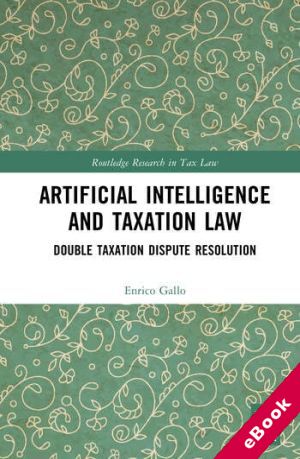
The device(s) you use to access the eBook content must be authorized with an Adobe ID before you download the product otherwise it will fail to register correctly.
For further information see https://www.wildy.com/ebook-formats
Once the order is confirmed an automated e-mail will be sent to you to allow you to download the eBook.
All eBooks are supplied firm sale and cannot be returned. If you believe there is a fault with your eBook then contact us on ebooks@wildy.com and we will help in resolving the issue. This does not affect your statutory rights.
This book identifies how artificial intelligence (AI) systems can be used as part of decision processes within international tax and transfer pricing disputes.
The issue of double taxation and its impact on economic development continues to escalate as globalisation causes states to interact on a growing scale. In recent years, AI applications have shown potential to solve this issue, particularly in reference to the length of time taken to resolve cases of double taxation in the field of transfer pricing. These cases can typically take at least two or more years to resolve, resulting in high cost to taxpayers and tax administrations. The book identifies the current legal frameworks available to prevent and solve tax and more specific transfer pricing disputes and details their advantages and disadvantages. Providing an analysis of what AI can offer to different legal principles, it shows how this can challenge existing rules, and the changes this requires within the legal framework. The book provides an overview of the challenges and opportunities that lie at the intersection of AI systems and the domain of international law, providing case studies to demonstrate its practical applications. It asks and answers the fundamental question: Can AI, or more specifically machine-learning, (ML) replace human decisions within the resolution of international tax and transfer pricing disputes?
The book will be of interest to researchers in the field of tax law, data protection law, consumer protection law, intellectual property law and artificial intelligence.